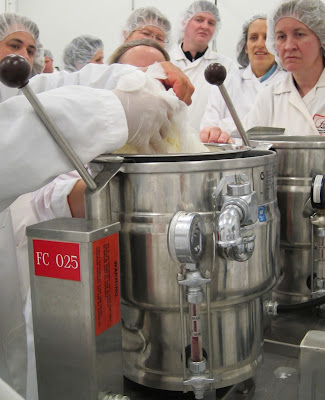Wild Serendipity Foods - Michelle Zimmer, Saskatoon
“Solve problems like an engineer – and don’t have a Plan B”
 Michelle Zimmer is the owner of Wild Serendipity Foods in Saskatoon. She has always loved to cook, but obtaining a degree in Engineering absorbed every waking second. For a number of years, cooking was delegated to second place.
Michelle Zimmer is the owner of Wild Serendipity Foods in Saskatoon. She has always loved to cook, but obtaining a degree in Engineering absorbed every waking second. For a number of years, cooking was delegated to second place. However, after working as an engineer in British Columbia for a few years, cooking and recipe collecting, which had been a serious hobby, turned into an obsession. “I felt a desperation to do anything with food,” says Michelle.
Michelle walked into a high-end restaurant in Victoria and begged the chef to hire her. That was the start of a very busy summer. She was an engineer by day and plating and serving in the restaurant at night – “fancy squiggly things – really cool.” But one summer was enough. “Working in a line kitchen is totally crazy,” says Michelle. “You have to be an adrenalin junkie.”
Michelle thought of setting up a high-end dessert bar as desserts can be prepared in advanced and it’s not as crazy. But she had student loans, and the costs were so high in Victoria.
Establishing a Business
 In 2004, Michelle and her husband moved back to Saskatoon. She started teaching community association cooking classes. “We’d cook and eat together,” says Michelle. “It gave me energy.”
In 2004, Michelle and her husband moved back to Saskatoon. She started teaching community association cooking classes. “We’d cook and eat together,” says Michelle. “It gave me energy.” She also decided to start selling sushi at the Saskatoon Farmers’ Market. Michelle got the go ahead from the Farmers’ Market and immediately quit her engineering job. And then she got another phone call from the Market. The public health regulations had changed; she would need a commercial kitchen.
Renting kitchen space would cost too much. Instead, Michelle took the plunge, signed a five-year lease and transformed a bicycle shop in a residential shopping mall into a commercial kitchen.
Streamlining the Business
It was a huge risk, but it has paid off. Initially, Michelle had six different business streams in order to make ends meet. They included the Farmers’ Market, corporate catering, children’s birthday parties, cooking classes, and business office lunches.
 As her sales picked up at the Farmers’ Market, Michelle cut out most of the other streams. Birthday parties and business lunches were the first to go. Then she sold her catering business. “I used the problem solving skills I’d developed as an engineer,” explains Michelle. “I looked at the different streams in terms of time and stress.”
As her sales picked up at the Farmers’ Market, Michelle cut out most of the other streams. Birthday parties and business lunches were the first to go. Then she sold her catering business. “I used the problem solving skills I’d developed as an engineer,” explains Michelle. “I looked at the different streams in terms of time and stress.”Four other chefs now use the commercial kitchen, so Michelle doesn’t have to work as hard to pay the rent.
Michelle also streamlined the products she offered for sale at the Farmers’ Market. At first, she sold a wide variety – from scones to sushi to ready-made meals. The scones were wildly popular. Michelle started out selling a couple of dozen a week – she now sells 750 a week during the peak summer season. Other products were less successful. They required too much work, and there were too many leftovers. Michelle now sticks to scones, soup and a few other products that can be frozen if they don’t sell.
Labour of Love
 It has taken Michelle five years to earn a reasonable income, and it remains a labour of love. “It’s so much work,” says Michelle. “If you don’t love it, you’ll never stick with it.” But she has no regrets and will advise her children to figure out what they love and how to make money doing it. “I would really regret it if health or life issues stopped me from following my dream,” she says.
It has taken Michelle five years to earn a reasonable income, and it remains a labour of love. “It’s so much work,” says Michelle. “If you don’t love it, you’ll never stick with it.” But she has no regrets and will advise her children to figure out what they love and how to make money doing it. “I would really regret it if health or life issues stopped me from following my dream,” she says. Michelle’s second piece of advice is to believe that you will succeed. “If you go into it with a Plan B,” says Michelle, “You are subconsciously thinking you will fail.”
Michelle says that the model for her business is Ina Garten, the Barefoot Contessa, an investment banker who became a cook specializing in granola, soups and scones. Following a similar path, Michelle hopes to eventually move back to British Columbia and open a bed and breakfast with a small storefront and coffee bar. I hope it works out – but not too fast – she’s a valuable part of Saskatoon’s foodie culture.
Note: I am writing a second article about Wild Serendipity Foods for the Saskatoon Farmers' Market newsletter. You can receive an electronic copy by emailing sfmnews@sasktel.com.




Comments